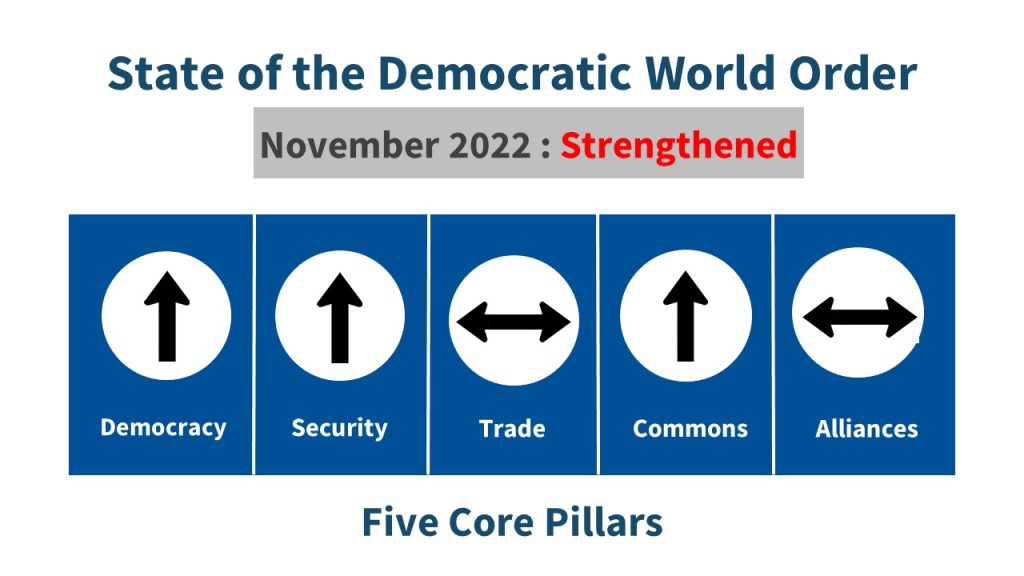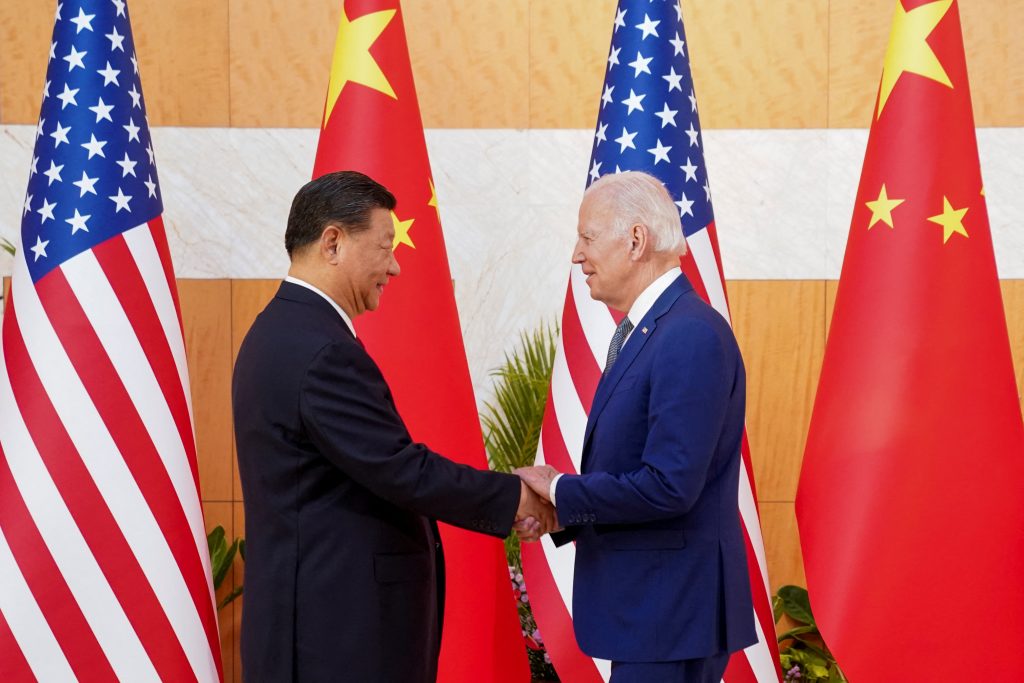Reshaping the order
This month’s topline events
Biden-Xi Summit. Meeting in-person for the first time as national leaders, President Joe Biden and Chinese President Xi Jinping sought to diminish tensions in what has become an increasingly adversarial relationship between China and the United States. On the sidelines of the G20 Summit in Indonesia, the two leaders agreed to reopen talks on climate change and discussed Russia’s invasion of Ukraine, with Xi reportedly agreeing with Biden that “nuclear weapons must not be used.” But Xi also warned the US not to “cross the redline” regarding Taiwan.
- Shaping the order. While the historic summit may help the two nations establish guardrails in their relationship, it is unlikely to impact the broader trajectory, as the US and China seem headed toward a potentially decades-long strategic competition over the future of the global order. Such a competition appeared to be playing out in real time, as Xi met separately at the G20 with French president Emmanuel Macron and earlier in Beijing with German Chancellor Olaf Scholz, suggesting that European leaders should act independently and distance themselves from US polices toward China.
- Hitting home. The intensifying strategic competition between the West and China will have direct implications for American businesses, which will need to look at ways to reduce vulnerabilities to China in critical sectors.
- What to do. Washington should continue to pursue cooperation with Beijing in potential areas of common interest. But with China seeking to undermine democratic solidarity, the US should prioritize efforts to forge a common strategic approach for dealing with Beijing among its core allies in Europe and the Asia-Pacific.
Protests Across China. In a remarkable show of bravery, thousands of demonstrators took to the streets in cities across China, many shouting anti-regime slogans, to protest Xi Jinping’s zero-Covid policies of forced quarantines and strict lockdowns. Chinese authorities responded to the protests – the most widespread in mainland China since the 1989 Tiananmen Square massacre – by arresting and intimidating demonstrators and restricting social media. Chinese officials later seemed to indicate a willingness to soften Covid restrictions. US officials reacted cautiously, defending the right to peaceful protest but avoiding direct criticism of Beijing.
- Shaping the order. The anti-government protests erupting across China suggest that Beijing’s response to Covid may not be a model of autocratic efficiency, as it was once touted. More broadly, the protests follow those recently taking place in Iran and Russia (albeit briefly) and appear to be part of a pattern of growing citizen unrest in autocracies around the world. But authoritarian regimes have become increasingly adept in clamping down on demonstrations and blunting their impacts, including by deploying and sharing more sophisticated surveillance technologies.
- Hitting home. American values are better protected in a world where democratic norms and human rights are respected.
- What to do. In coordination with allies, the Biden administration should supplement measures to constrain authoritarian governments with assistance to non-violent civil resistance movements across the world. Its upcoming Summit for Democracy, in March 2023, will provide an opportunity to focus on efforts in this space.
Russia Scales Back. In a significant setback for the Kremlin’s war aims in Ukraine, Russian forces pulled out of Kherson, the capital of one of the four regional provinces that Russian president Vladimir Putin formally purported to annex in September. As Russian forces consolidate, the Ukrainian military appeared to be preparing for a new counteroffensive potentially aimed at seizing back territory to the south and east. Russia continued to strike power and water facilities across the country, causing widespread outages as a cold winter approaches, as G7 leaders condemned the “barbaric missile attacks” on civilian infrastructure.
- Shaping the order. While the conflict is likely to go on for months, the tide of the war continues to turn in favor of Ukraine, as Russian forces have been put on the defensive. Russia also appears to be increasingly isolated on the global stage, with Putin choosing to stay away from the G20 leaders’ summit in Bali – one that concluded with a joint statement announcing that “most leaders” strongly condemned the war in Ukraine and declaring the threat to use nuclear weapons as “inadmissible.”
- Hitting home. America is less secure in a world where global powers can invade their neighbors and commit war crimes with impunity.
- What to do. Washington should work with allies to ensure that Ukraine continues to receive advanced weapons and equipment to repair power and water systems, while seeking to incentivize governments in the global South to join in efforts to sanction and isolate Russia.
Quote of the month
“[I]f we let Putin win, all of us will pay a much higher price, for many years to come… There can be no lasting peace if the aggressor wins. There can be no lasting peace if oppression and autocracy prevail over freedom and democracy.”
– NATO Secretary General Jens Stoltenberg, November 29, 2022

State of the Order this month: Strengthened
Assessing the five core pillars of the democratic world order
Democracy (↑)
- In the most significant protest movement in mainland China since the Tiananmen Square massacre, thousands of citizens across the country demonstrated against Xi Jinping’s zero-Covid policies, many shouting anti-regime slogans, as government authorities arrested and intimidated demonstrators and restricted social media.
- The UN Human Rights Council approved an investigation into human rights abuses in Iran, where over 300 people have been killed and 14,000 arrested since anti-regime protests began three months ago.
- In the US midterm elections, nearly every candidate for an office that oversees and certifies elections in battleground states that had denied the results of the 2020 election was defeated — a win for the integrity of America’s democratic system.
- Venezuelan president Nicolas Maduro, who had been diplomatically isolated after conducting fraudulent elections in 2018, was welcomed back to the international community, attending a UN climate conference in Egypt and shaking hands with French President Emmanuel Macron and US climate envoy John Kerry.
- On balance, the democracy pillar was strengthened.
Security (↑)
- In a significant battleground victory for Ukraine, Russian forces pulled out of Kherson, a key southern city and capital of one of the four regional provinces that Russian president Vladimir Putin formally purported to annex in September.
- Russia came under increasing diplomatic pressure over its aggression in Ukraine, as Putin backed out of the G20 summit and faced subtle pushback from allies in a meeting of the Collective Security Treaty Organization, a Russian-dominated alliance of post-Soviet nations.
- North Korea test-fired an intercontinental ballistic missile potentially capable of reaching the US mainland, a move strongly condemned by the US and its allies, including Japan and South Korea.
- At a meeting in Tehran signaling a growing polarization between democracies and autocracies, officials from Russia, China, Iran, North Korea, Syria, Venezuela, Belarus, and other nations issued a joint rebuke of the “so-called rules-based order” and criticized efforts to “divide our world into blocs.
- In light of Russia’s setbacks in Ukraine, the security pillar was strengthened.
Trade (↔)
- France and other European nations criticized subsidies for US companies included in the recently passed Inflation Reduction Act, suggesting that such measures were protectionist and inconsistent with principles of an open economic order.
- Russia asked India for assistance in keeping vital industries running, as the two nations exchanged lists of products that could be the basis for expanded trade between the two nations, despite Western sanctions on Russia.
- On balance, the trade pillar was unchanged.
Commons (↑)
- With emissions likely to reach historic levels this year, the US and its allies agreed at a global climate summit in Egypt to establish a fund for wealthy industrial nations to compensate developing countries for negative effects of climate change and accelerate global decarbonization.
- China braced for significant increases in nationwide Covid-related illnesses as the government’s zero-Covid strategy came under pressure in the wake of a looming economic slowdown and an under-vaccinated population.
- With the actions taken at the climate summit, the global commons pillar was strengthened.
Alliances (↔)
- G7 leaders, meeting on the margins of the G20 summit in Bali, jointly condemned Russia’s “barbaric” missile attacks on Ukrainian civilian infrastructure, and vowed to hold Russia accountable.
- While in Asia, President Biden met with his counterparts from Japan and South Korea and resolved to forge closer trilateral links, amid continuing discord between Tokyo and Seoul, and also announced a new economic security dialogue among the three nations.
- In a sign of potential divergence among allies, Emmanuel Macron accused former Australian prime minister Scott Morrison of provoking “nuclear confrontation” with China, and, in a meeting with Indo-Pacific leaders, called for “dynamic balance” with regard to China as opposed to strict alignment with the US.
- Overall, the alliance pillar was unchanged.
Strengthened (↑)________Unchanged (↔)________Weakened (↓)
What is the democratic world order? Also known as the liberal order, the rules-based order, or simply the free world, the democratic world order encompasses the rules, norms, alliances, and institutions created and supported by leading democracies over the past seven decades to foster security, democracy, prosperity, and a healthy planet.
This month’s top reads
Three must-read commentaries on the democratic order
- John Ikenberry, in Foreign Affairs, contends that as the world faces a struggle between liberal and illiberal world orders, America is well-positioned to succeed given the appeal of its ideas and capacities to build partnerships and alliances.
- Andrea Kendall-Taylor, in Foreign Affairs, argues that despite its mounting setbacks in Ukraine, Russia will remain a formidable threat to the United States and its allies.
- Fareed Zakaria, in the Washington Post, contends that while much has been written about democracy’s fragility, the world’s most powerful autocracies are showing signs of deep and structural weaknesses.
Action and analysis by the Atlantic Council
Our experts weigh in on this month’s events
- In an Atlantic Council Strategy Paper, Matthew Kroenig and Jeffrey Cimmino joined Stephen Hadley, William Taylor, John Herbst, and Melinda Haring in proposing a long-haul strategy to help Ukraine win the war against Russia and secure the peace.
- Dan Fried, in Just Security, contends that initiating negotiations to end the Ukraine war on Putin’s terms is oddly timed, and potentially dangerous.
- Peter Engelke, in the New Atlanticist, outlines key recommendations for G20 member states on how to combat global food insecurity, in the context of the Atlantic Council’s Global Food Security Forum in Bali, on the sidelines of the G20 summit.
- Atlantic Council experts react to recent waves of protests in China against the Chinese Communist Party’s (CCP) restrictive Covid-19 policies.
__________________________________________________
The Democratic Order Initiative is an Atlantic Council initiative aimed at reenergizing American global leadership and strengthening cooperation among the world’s democracies in support of a rules-based democratic order. Sign on to the Council’s Declaration of Principles for Freedom, Prosperity, and Peace by clicking here.
Ash Jain – Director for Democratic Order
Dan Fried – Distinguished Fellow
Jeffrey Cimmino – Associate Director
Danielle Miller – Program Assistant
Otto Hastrup Svendsen – Georgetown Student Researcher
If you would like to be added to our email list for future publications and events, or to learn more about the Democratic Order Initiative, please email AJain@atlanticcouncil.org.
Image: U.S. President Joe Biden shakes hands with Chinese President Xi Jinping as they meet on the sidelines of the G20 leaders' summit in Bali, Indonesia, November 14, 2022. REUTERS/Kevin Lamarque
